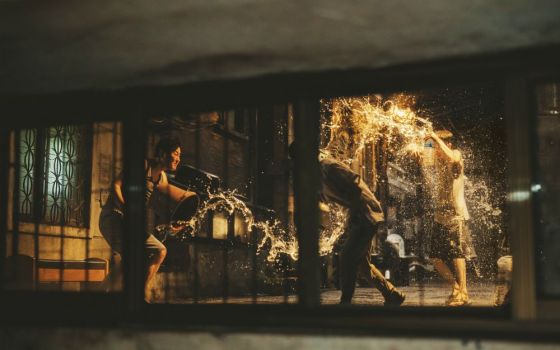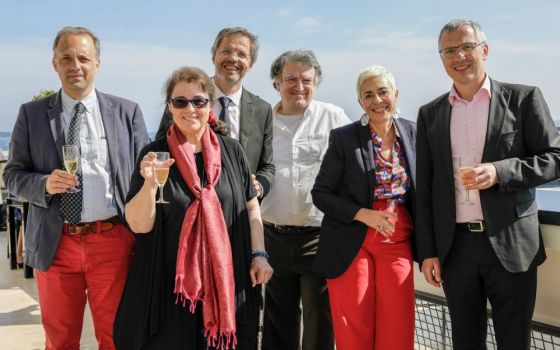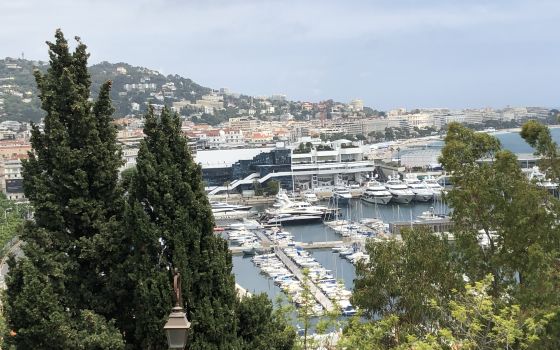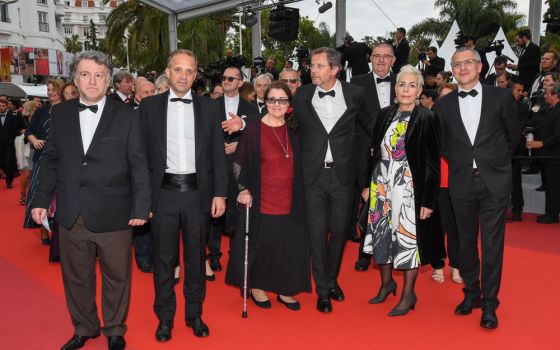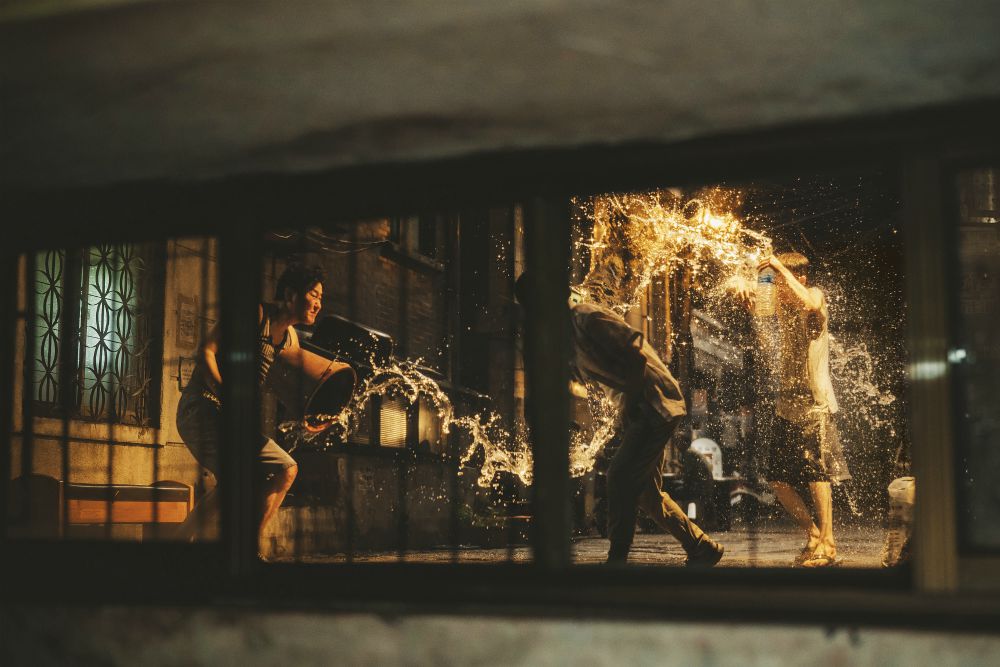
Scene from "Parasite" by Korean director Joon-ho Bong; it won the Palm d'Or in the 2019 Cannes Film Festival. (CJ ENM Corporation, Barunson E&A)
One of the press releases for the Cannes Film Festival noted of the 1,845 feature films submitted from 39 countries for the competition to the selection committee, 26% were directed by women. In fact, the selection committee, responding to protests made at last year's festival, was 50% female for the first time ever. The official selection of 69 films for the festival consisting of feature films and short films included 19 directed by women, or 27.5%.
The Cannes Film Festival in 2018 was marked by a demonstration of 82 women about the lack of female representation in the festival's competition. Famed French New Wave director Agnès Varda was one of its leaders. She died in March at age 90. It is worth noting that her image graces the festival poster of this year's festival.
And now for my remaining reviews:
"It Must Be Heaven" is a comedic social commentary by Palestinian Christian director Elia Suleiman and it ranks very high on my list of festival favorites. Suleiman plays a filmmaker who is trying to get a film made at home in Paris and finally New York where he is told his film is "not Palestinian enough." He barely says a word as he watches his neighbor in his hometown of Nazareth invade his lemon orchard and reshape it. This comes after a hilarious moment at the Easter services at his Greek Orthodox Church when a couple of drunks lock the church doors and refuse to open them at the priest's liturgical command. When he goes to Paris, his bemused Buster Keatonesque look at the absurdity of the world continues through a series of vignettes where he observes a situation and watches it play out in relation to himself as his own protagonist. When he arrives in New York, everyone is armed, handguns, Uzis, even a man getting out of a taxi with a bazooka. What is the filmmaker trying to say? At the press conference after, always wearing the same hat and the same bemused look, he explained that all the world is Palestine. Lots to think about here.
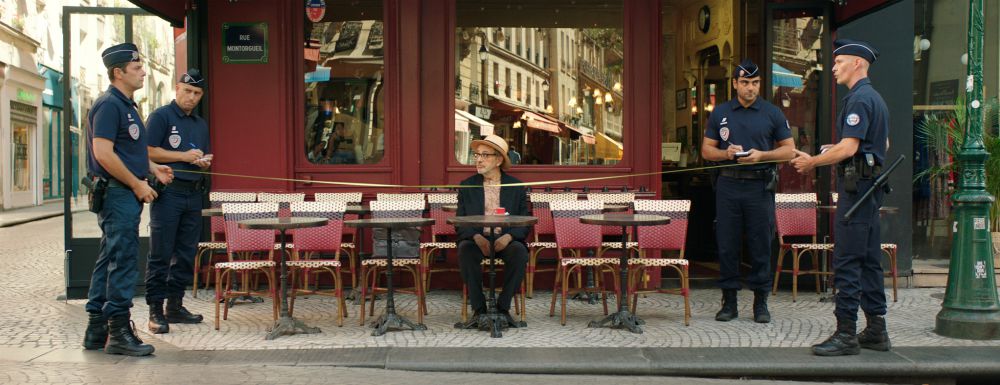
Scene from "It Must Be Heaven" (Rectangle productions, Nazira films, Pallas film, Possibles Media, Zeyno film)
"Once Upon a Time … in Hollywood" from director Quentin Tarantino was the only film introduced with a plea not to give away the plot before the film's release in July. So all I will say is that it is vintage Tarantino for the violence, but real events shape the story. Brad Pitt and Leonardo DiCaprio fulfill their roles very well as do Margot Robbie and all the other starts who make appearances. It did not win any prizes, again, maybe for its American sensibilities. I don't know.
"Parasite" by Korean director Joon-ho Bong, won the Palm d'Or, and I think it deserved it, though it wasn't my choice. The story revolves around a family living in a rat-infested apartment, its one window at sidewalk level in Seoul. The college-age son and daughter are very creative and want to get ahead. The mother and father work every scam they can to survive. When the son is offered a job tutoring a rich teenager in English in the place of his friend who is going to America, he takes it and slowly manipulates the naïve mother into replacing her employees with his sister and parents. But when the rich family is away and the poor family relaxes into complacency, the fired housekeeper returns and things go terribly and violently amiss. The violence in Korean films is as intense as in a Tarantino film, though perhaps not so gratuitous. Here it is the outward manifestation, I think, of the violence of a poverty that smothers people. This is a riveting film about social class, status and the growing gap between the rich and the poor in contemporary South Korea.
"The Traitor" is from Italian director Marco Bellocchio and tells the true story of Tommaso Buscetta, a member of Cosa Nostra, who gave the state evidence that led to the conviction of more than 300 members of the mafia. But was Buscetta a traitor? Played convincingly by Italian star Pierfrancesco Favino, Buscetta rationalizes his testimony against his confreres by defining Cosa Nostra as different from the mafia. Rather, it is an organization with values: Its members don't kill women and children for one. Because his confreres do, they are members of the mafia, and, therefore, it is ethical for him to give evidence against them — and he does. Many will recall the events depicted in the film, especially the murder of Judge Giovanni Falcone whose investigation and interrogation of Buscetta led to the convictions. This is a brilliant film really, but it's hard to watch — and Buscetta's logic is hardly moral. What it did was get him and his family lifelong witness protection, and he died peacefully in his bed in 2000 in New York.
"Young Ahmed" is the latest from director/writer brothers Jean-Pierre Dardenne and Luc Dardenne, whose films have been favorites of the Cannes festival as well as the ecumenical jury. Here, Ahmed is a 14-year-old Muslim French school boy who becomes radicalized by a young imam at a pop-up mosque. Ahmed tries to kill the caring teacher who taught him to overcome his dyslexia in her after-school program because she is also now teaching a class in modern Arabic instead of that of the Quran. When Ahmed tells the imam, the imam turns him in — an action that saves the mosque, and gets two months of detention for Ahmed. He also must go to sessions with a psychologist and work on a farm. He is continually supervised during his detention but manages to escape. He tries something very dramatic, but does he change, really? This film will most likely get U.S. release and when it does, it should spur some deep conversations about the intended audience for the film, the psychology of radicalization, the family, the nature of religion, and on and on.
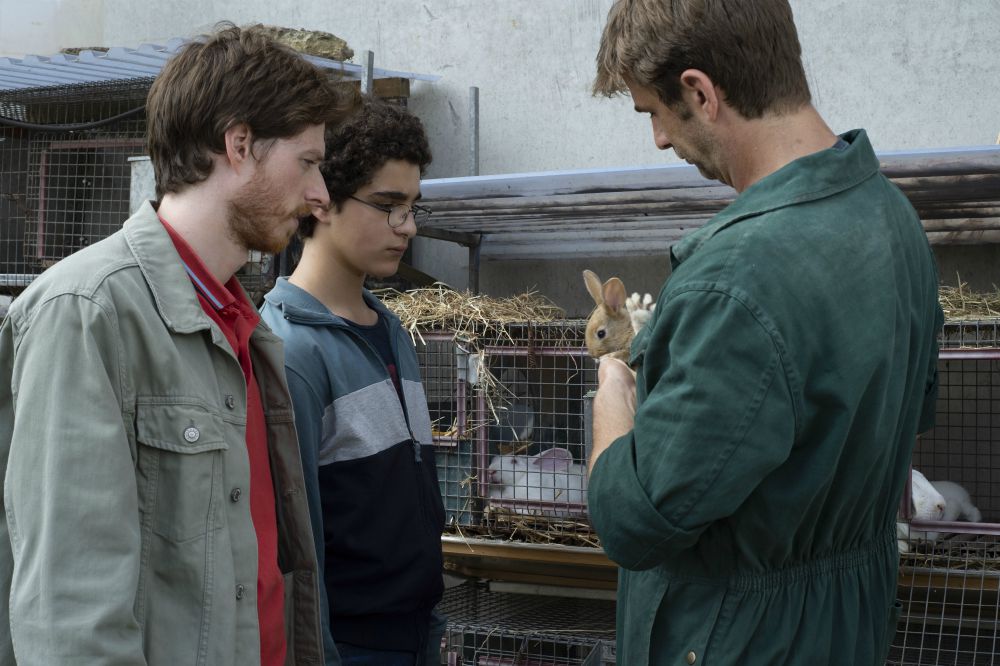
Scene from "Young Ahmed" (Christine Plenus)
"The Wild Goose Lake" is from Chinese director Yi'nan Diao. It is a mystery about a man who has killed a policeman and law enforcement's inept attempts to track him down. Using a prostitute as a confidential informer, the police make her approach the man's depressed wife to try and locate him. I think the film may be underrated; it turns out to be a film about women who are very canny and cunning, but you have to go through China's criminal underbelly and loads of violence to get to it.
"Pain and Glory" from director/writer Pedro Almodóvar is the story of an aging homosexual film director, Salvador, played by Antonio Banderas. It is one of three films dealing with homosexual themes in the competition. The film returns Salvador to his childhood and his first sexual awakening. We see his desire to write and direct again frustrated, his reconciliation with an actor he condemned for not playing a role as Salvador had written it 30 years previously, renewing his use of heroin, and meeting again the love of his life, now married and living with his family in South America. Through the process of losing his beloved mother and the renewal of relationships, Salvador is free to write again. Banderas won the festival's best actor award for his performance. The film is beautifully filmed and very much standard Almodóvar.
"Matthias et Maxime" is a drama from the young multitalented French Canadian director Xavier Dolan. As may be surmised by the title, it is about two young men. They share a mutual attraction heretofore unacknowledged. The film's opening 15 minutes or so drove me crazy. Several guys gather at a lake house to celebrate before their friend Maxime, played by Dolan, leaves Quebec to take a job in Australia. Matthias, a lawyer, has a younger sister, Erika, who wants to make a movie using Matthias and Maxime as the main characters and who must share a kiss. Both men recoil at first. Erika's valley-girl affectation and non-stop talking in French was profoundly annoying, and it was such a relief when her time in the film was over. However, the kiss awakens the characters' search for sexual identity and unarticulated yearnings and this forms the plot of the film, Erika's role as a catalyst notwithstanding. Dolan has made his mark at the Cannes festival with previous films and served on the main jury in 2015.
Advertisement
"Portrait of a Lady on Fire" is a historical drama from French director Céline Sciamma and tells the story of a young painter, Marianne. She is hired to paint a portrait of Héloïse, a wealthy young woman her mother just removed from the convent because of her elder daughter's death. Now Héloïse is to inherit everything and must make a good marriage but she refuses to allow her face to be painted as a way to attract a suitor. The mother convinces Marianne to befriend Héloïse and paint her face from memory in a hidden room. The two young women, isolated in their own ways, become friends then lovers when the mother leaves their coastal island home for a few days. Héloïse must do as she is bidden, and though the two never meet again, the power of a symbol unites them. While the story is predictable, the premise is unique, and the late 18th-century European context makes it interesting from a cultural perspective.
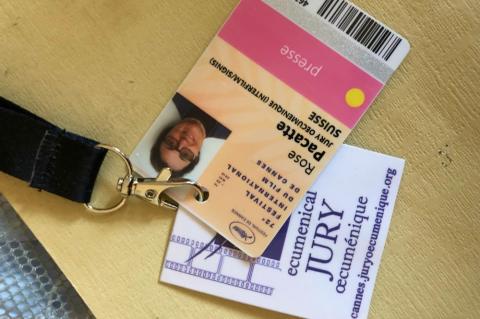
Sr. Rose Pacatte's 2019 press pass for Cannes Film Festival
"The Whistlers" is a crime thriller from Romanian director Corneliu Porumboiu that starts off with a Romanian police office going to the Canary Islands to learn to whistle in a kind of code in order to eventually solve a crime. It is very convoluted, original and has a surprise ending — kind of — but you have to stay with it.
The last film of the competition was "Sibyl" (note, I did not see "Frankie" from director Ira Sachs, as the jury members who went to the late-night screening let me know it didn't meet our ecumenical jury's criteria). French director Justine Triet directs this film-within-a-film with a psychologist who wants to be a novelist as the protagonist. Sibyl has a split personality and cannot let all of her clients go and breaks all the professional codes of conduct by following one of them to the set of a film while making them characters in her novel. There is way too much sex in this otherwise interesting film to make it worth watching (Flannery O'Connor once said there only needs to be enough sex and violence in fiction to make the story believable — too much and it ceases to be art. The same can be said for movies, I think.) The best character is actually Sandra Hüller who plays Mika, the director of the film-within-the-film. She is fantastic and in her own way has to deal with complexities in her own reality.
It was a great experience to be part of the ecumenical jury at Cannes, and I am grateful for the opportunity to have spent time with my fellow jury members and meeting the wonderful people of Cannes who believe so much in ecumenism and cinema as art.
[Sr. Rose Pacatte, a member of the Daughters of St. Paul, is the founding director of the Pauline Center for Media Studies in Los Angeles.]




